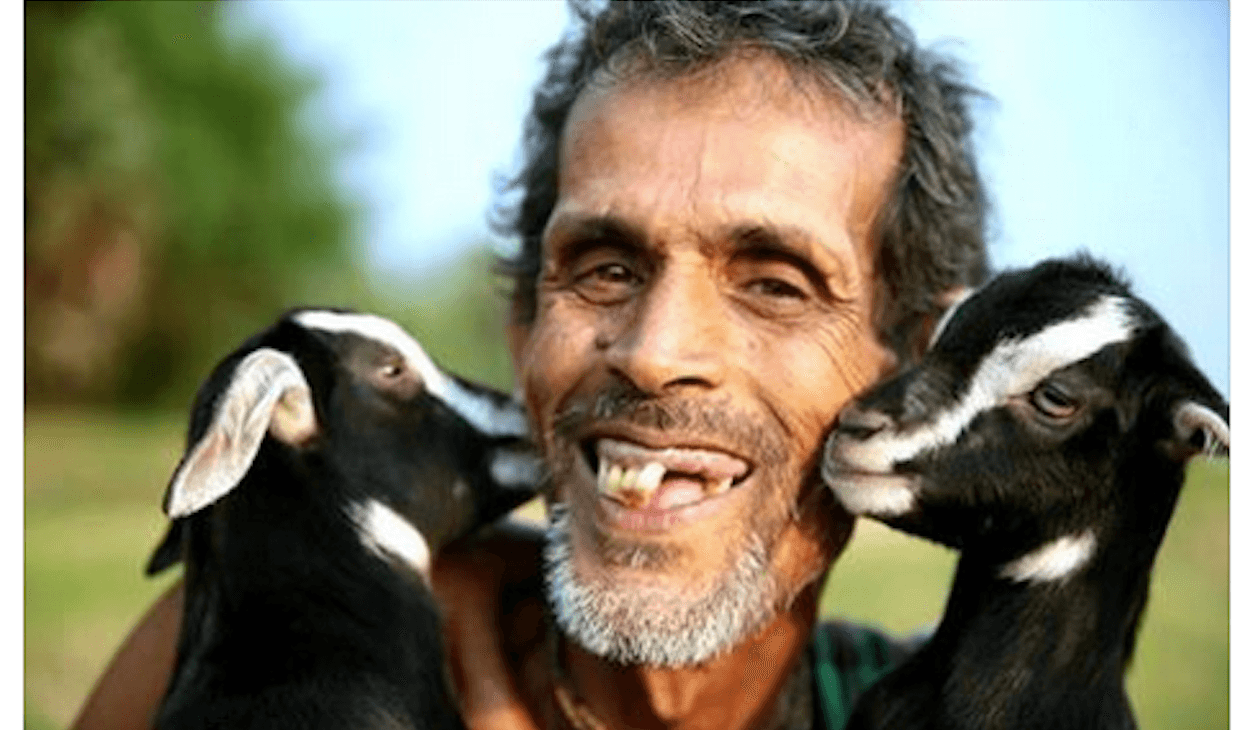Humans of New York, meet the Goats of Bangladesh
Now that's a man who loves his goats.
BANGKOK, Thailand — One muses on the pitfalls of attachment. Another stands in front of a ship and offers lore on the Titanic. A fearsome character is asked what he or she thinks about an upcoming visit by Indian Prime Minister Narendra Modi.
The interviewees, however, aren’t people.
Humans of New York, meet the Goats Of Bangladesh.
The beloved Facebook page features in-depth “interviews” with the animals, ubiquitous in the South Asian country’s capital, Dhaka, and in the countryside. In each post there's a picture and a quote that is at turns witty or reflective.
It’s “Real Goats. Real Stories.”
The page was born almost a year ago on an October morning in Dhaka, when Sadman Sakib Rahman was going through his Facebook feed and saw a post on the Humans of New York page.
“I was interested in finding something with the same concept but for Bangladesh. Unfortunately I couldn't find anything which quite grasped the concept of HONY,” he recalled in an email interview, using the acronym for the page. “So I thought about doing something similar to HONY but not a mockery of it yet having a different vibe to it.”
The annual Islamic holiday Eid Al-Adha, which involves ritual slaughter and food donations to the needy, was approaching. Rahman noticed all the goats and cows outside.
“I took a few nice pictures of a few goats in my camera and the goats seemed to appear with human-like expressions in the pictures and that's when I got the idea of Goats Of Bangladesh,” he said. His friends — all students around 18 or 19 years old — joined in.
The first post was a profile shot of a dark-haired goat, which delivers one line:
"I've always wanted to be the finest lamb roast in my village.”
The posts have expanded in length and subject matter since then, and so has the page’s popularity. From one member running it to a team of eight, Goats Of Bangladesh has developed something of a following. The page has been covered in the regional press, and last month the BBC featured some of the crew in an on-the-ground report from a goat market. They have more than 35,000 likes and counting.
“Our country is filled with goats, and the fun part [of] it, they all seem to roam around, be free and do what they want. This gives rise to potential situations where we can take pictures of goats which seem to act just as if they were humans,” Rahman said, pointing out that the animals are even part of the language.
“Sagol” means “goat” or "sheep" in Bengali. A well-known insult is “Tumi akta sagol!”
“You are a goat!”
Though many posts are satirical and have one or two animals in the frame, the most popular is a heartwarming fictional interview written by the site to go with a fan-submitted photo of a child clutching his pet goat.
“Is this your goat?”
“Yes.”
“Where did you find him?”
“I didn’t find him. My family bought him during Eid-Ul-Azha [alternative spelling of Eid Al-Adha]. We aren’t wealthy, so we could only afford two goats for the family. My father said this goat was mine. That it would be sacrificed in my name. But I didn’t want that to happen. I won’t let anyone’s death go under my name.”
“Your father was okay with that?”
“He was. But he reminds me almost every week how much that goat had cost him. Every time he tells me that, I tell him it’s my goat. I do what I want with him.”
“Why do you want to keep this goat so bad?”
“My sister was wedded off when I was 3 years old. I have no one else in this village. None of the other kids like me and there’s nothing else to do in my free time. So I sit and play with my goat. He is my brother. I love him.”
